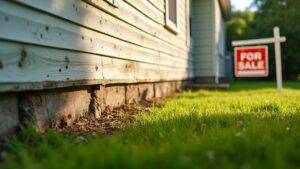Selling a hoarder home comes with legal risks that most sellers do not expect. You must deal with hidden hazards, repair needs, and possible code violations. These issues can make selling your property much harder.
Ignoring these legal requirements can lead to big problems. You could face lawsuits, fines, or delays if you fail to disclose known defects. Buyers can back out or demand costly repairs if you do not meet the law.
You can avoid these problems by learning the rules and following them when selling a hoarder home. The best way to sell a hoarder home is to understand and meet all legal obligations before listing.
This helps you sell faster and protects you from future trouble. This blog will guide you through the legal steps needed to sell a hoarder home safely and successfully.
Key Takeaways
- Sellers must disclose all known property defects, hazards, and code violations to potential buyers as required by state law.
- Thorough inspections for hidden damage, mold, pests, or biohazards are crucial before listing to avoid legal disputes.
- Obtain necessary cleanup permits and comply with local health and safety codes to prevent fines or sale delays.
- Properly document all remediation, repairs, and hazardous waste disposal efforts for legal protection and buyer transparency.
- Unresolved violations or failure to disclose issues can result in contract termination, lawsuits, or financial penalties after the sale.
Understanding Property Disclosure Laws
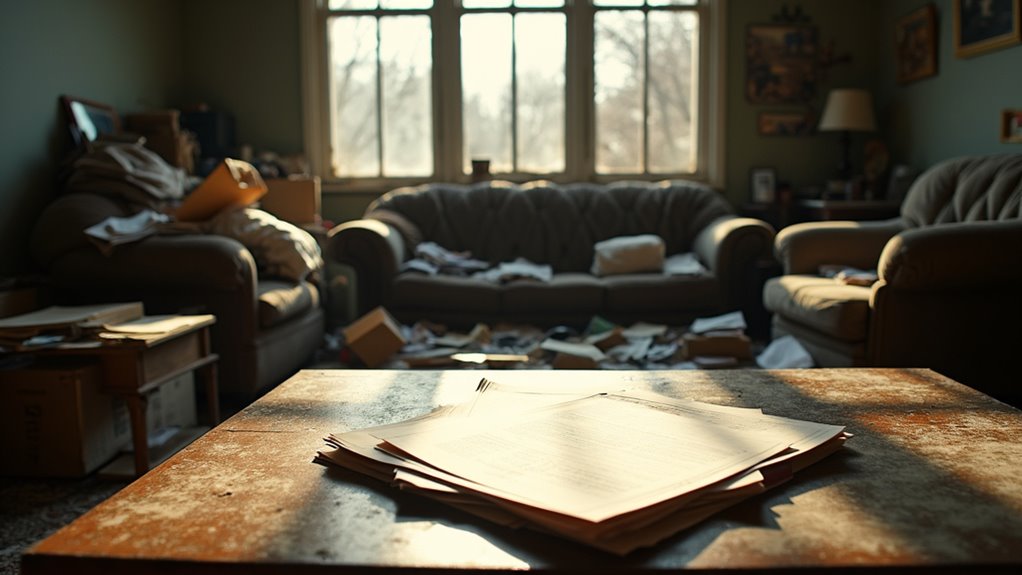
Property disclosure laws require you to tell buyers about important problems with a hoarder home. You must share any known issues that could affect the home’s value or safety. This includes damage hidden by clutter or issues with the structure.
If there are unpaid property tax liens, you need to let the buyer know. Zoning violations caused by hoarding must also be disclosed. Buyers need this information to make an informed decision. In Virginia, sellers should also identify any encumbrances on the property as shown in the title report to help buyers understand any obstacles to a clear title.
If you hide important details, you could face lawsuits or delays. Each state has its own disclosure forms, so review them carefully. Consider talking to a real estate attorney if you have questions. Working with a professional experienced in Virginia property regulations can help you provide accurate disclosures and avoid legal complications.
Identifying Required Repairs and Remediation
You’ll need to thoroughly assess the property for structural damage caused by long-term clutter and neglect. It’s also essential to identify and address any health hazards, such as mold, pests, or biohazards, before listing the home. Certified inspections can be especially helpful for uncovering hidden problems like water or mold damage that may otherwise be missed during a surface evaluation.
Tackling these issues not only ensures compliance with legal requirements but also protects you from future liability. Taking proactive steps to resolve health risks like mold, pests, or biohazards can help ensure you meet Virginia’s disclosure rules and avoid potential legal complications.
Assessing Structural Damage
Assessing structural damage is important before selling a hoarder home. Belongings can hide problems in walls, floors, ceilings, and the foundation. Clear enough space to check these areas properly.
Look for signs of water damage, weak supports, or pest activity. These issues affect the home’s value and future repairs. If you find problems, take photos and make notes for records.
A licensed inspector can help spot hidden damage. If you discover major issues, it may be upsetting for everyone involved. Knowing the true condition helps you decide on repairs or pricing.
If you address problems early, you avoid surprises later. Understanding the home’s state also protects you during the selling process. Always keep clear documentation for legal and financial safety.
Addressing Health Hazards
A hoarder home can have serious health risks even after clutter is removed. Common hazards include mold, pests, and biohazards. These problems may affect your legal responsibilities and a buyer’s interest.
If you want to address these risks, hire certified professionals to inspect the property. They will check the air quality and look for hidden contaminants. All findings and repairs should be recorded for legal reasons and full disclosure.
Complying With Local Health and Safety Codes
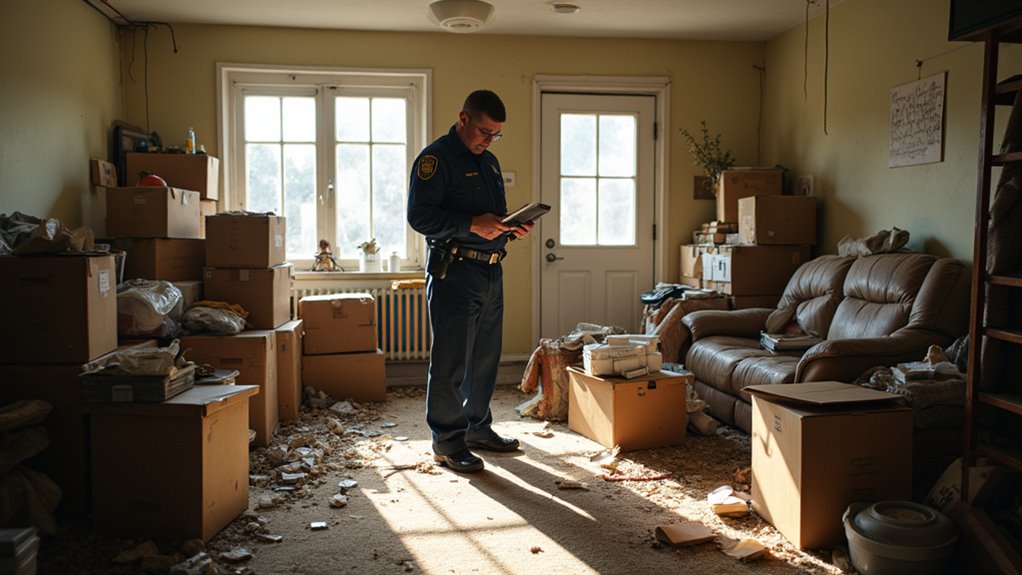
Complying with local health and safety codes is necessary when selling a hoarder home. Every city or town has its own rules for property conditions and waste removal. You must follow these rules to avoid penalties or delays.
Following local health and safety codes is essential when selling a hoarder home to prevent penalties and ensure a smooth process.
Start by removing all clutter, debris, and hazardous items as required by local laws. Proper waste disposal is important and must meet municipal standards. If you ignore this, you could face fines. You should also be aware that failing to address required inspections could result in legal complications or prolong the selling process.
After cleanup, make sure the home is safe and easy for buyers to visit. All exits should be clear, and utilities must work properly. Keep records of your efforts in case you need to show proof later.
Meeting these codes protects you from legal problems and helps your house sell faster. Buyers and inspectors will check if the home meets safety rules. If you follow the rules, you make the process easier for everyone.
Additionally, selling your property as-is in Fishersville is possible, but even then, adhering to local health and safety regulations can prevent unexpected legal complications during the sale.
Addressing Mold, Pest, and Biohazard Issues
You need to identify any mold, pest, or biohazard issues before listing your hoarder home, as these can pose serious health risks. You’re legally required to disclose such hazards to potential buyers, and failing to do so can lead to liability. Addressing these problems early protects both your interests and those of future occupants.
In Broadway, sellers often benefit from guaranteed all-cash offers which streamline the process even for homes needing significant remediation. Obtaining detailed reports from licensed experts documenting the extent of pest or mold damage and any treatments is essential to meet legal requirements and streamline the sale.
Identifying Health Hazards
Hoarder homes can contain many health hazards. Mold, pests, and biohazards are common problems in these spaces. Clutter and neglect make these issues worse.
You should inspect every room, even behind piles. Look for mold, rodent droppings, insects, or strong odors. If you spot these signs, there may be hidden damage.
Effective junk removal helps you reach all areas. You can check for problems that were hidden by clutter. Take photos and notes to document any findings.
If you find serious hazards, early action is important. Quick responses protect your health and may lower legal risks. Good documentation can help with insurance claims or future sales.
Legal Disclosure Requirements
You must tell buyers about mold, pests, or biohazards in a hoarder home. The law requires you to share these hazards before selling. If you do not, you could lose the sale or face a lawsuit.
Estate planning and inheritance laws also apply if you inherit a property. You still have to make honest disclosures. Buyers need to know about anything that affects safety or value.
You should share information about mold on walls or ceilings. List any rodent or insect infestations. Tell buyers about hazardous biological waste or damaged HVAC systems.
Mention any water damage that could weaken the structure. Giving accurate details protects you from legal trouble. Transparent disclosures help make the sale process smoother.
Managing Hazardous Materials and Waste
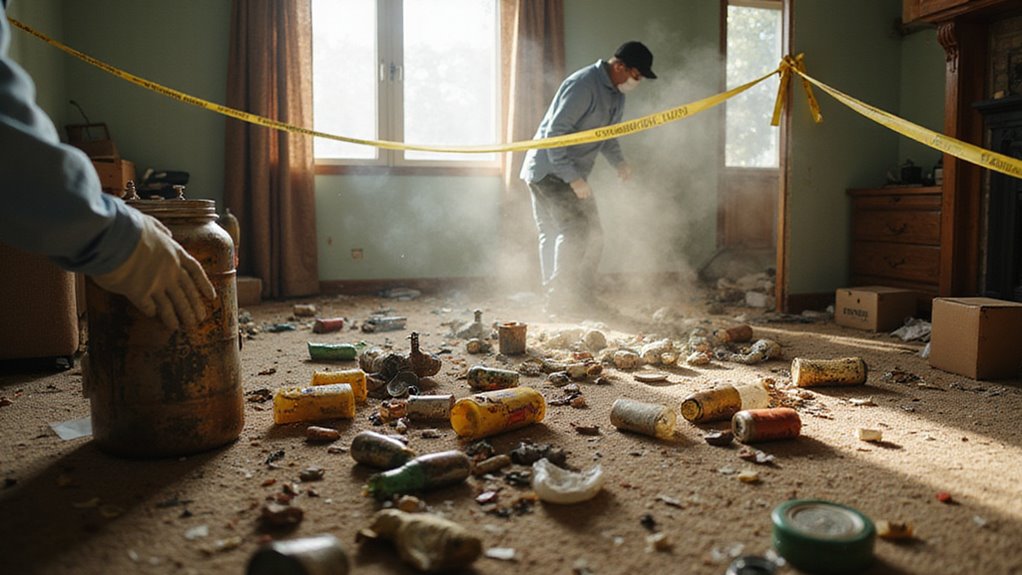
Managing hazardous materials and waste is essential when preparing a hoarder home for sale. Hazardous items can include chemicals, old medicines, batteries, and sharp objects. Following proper handling steps keeps everyone safe.
You should also maintain organized files of any cleanup efforts and hazardous waste disposal, as proper documentation facilitates a smooth transaction process.
Biological risks, such as animal droppings, mold, or rotten food, may need special cleanup. If these are present, you must use biohazard methods. Ignoring them can cause health or legal problems.
Local or federal laws may require safe removal and disposal of these materials. You should check your city’s guidelines before starting cleanup. If you document your actions, you can protect yourself during the sale.
Proper management of hazards will keep future owners safe and help the home sell more easily. If you follow all rules, you lower your risk and improve the property’s value. In some cases, you may be able to sell houses as-is, which can simplify the process by eliminating the need to make repairs related to hazardous material cleanup.
Working With Professional Cleaners and Remediators
Hiring professional cleaners and remediators is usually the safest and most effective way to clean a hoarder home. If you try to do it yourself, you might miss hidden dangers. Professionals know how to handle biohazards, strong odors, mold, and pests. These experts use special tools and safety gear for the job.
Their work can help improve a home’s value and make it safer for buyers. If you hire them, you also lower the risk of missing important cleanup steps. In Virginia, working with professionals is also recommended since proper disclosure of violations builds trust with buyers and reduces legal risks during a sale.
A professional team will use industrial cleaning tools, protective suits, and strong odor removers. They can also treat mold and pests if needed. You should expect clear reports and a set timeline for the work. In some cases, it may be smarter to skip cosmetic fixes that don’t affect safety or structure, as buyers may prefer to make their own improvements after a thorough clean.
Navigating Zoning and Occupancy Regulations
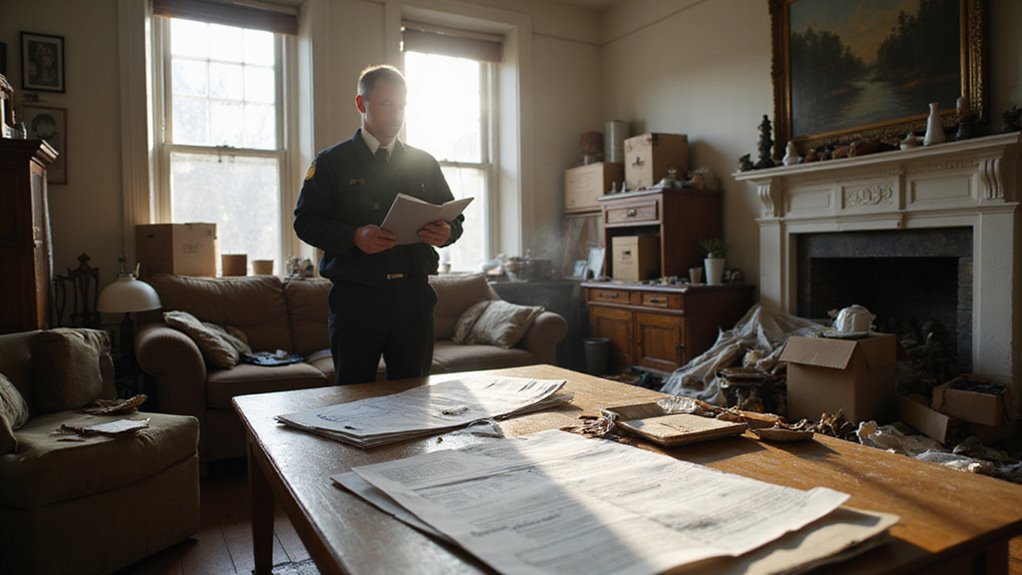
Zoning and occupancy rules decide how you can use a property. You must check these rules before selling a hoarder home. If you skip this step, you may face delays or legal issues.
Local zoning laws say what changes are allowed on a property. Junk removal or remodeling could impact compliance. Always compare city records to the current home layout. Setting a competitive price for the property, based on recent sales data in your Virginia area, can help attract more buyers and accelerate your sale even if zoning corrections are needed.
Some cities limit how many people can live in a home based on space or room size. Hoarding may have changed these numbers. Fix any problems before you list the property.
If you find differences in records, address them right away. A zoning official or real estate lawyer can help. Their advice can save you time and trouble later. Coordinating early with professionals and having all paperwork organized can help avoid delays during the closing process.
Obtaining Necessary Permits and Inspections
Before listing a hoarder home, you’ll need to secure any required cleanup permits and schedule mandatory safety inspections. Local authorities often mandate these steps to ensure the property meets health and safety standards. Addressing these requirements early helps you avoid costly delays and legal complications during the sale. It’s also essential to conduct a detailed title search to identify any liens or disputes that could affect the transfer of ownership.
Required Cleanup Permits
You need cleanup permits before selling a hoarder home. Local governments set rules for removing clutter and hazardous items. If you miss this step, you may face fines or delays.
Contact your city’s code enforcement office to ask what permits are needed. Officials will tell you about inspections and legal requirements. This helps you avoid problems during the sale.
Typical permits include large debris removal and hazardous waste disposal. You may need approval from the health department for biohazard cleanup. Special permits are sometimes needed to move large items.
Always get proof of legal disposal from approved facilities. These documents protect you from future issues. Securing all permits makes the selling process smoother.
Mandatory Safety Inspections
Safety inspections are essential before selling a hoarder home. They help find hazards that could stop a sale or cause legal problems. Inspectors check for unsafe wiring, hidden mold, and poor waste handling.
If you skip inspections, you risk legal issues if buyers later find dangers. Inspectors usually look for hazardous materials, structural problems, and waste issues. Each item helps keep the home safe and legally compliant.
Permits are often needed for repairs after inspections. Local rules may require proof that hazards were handled safely. If you follow inspection rules, you protect your money and the buyer’s safety.
Dealing With Code Violations and Fines
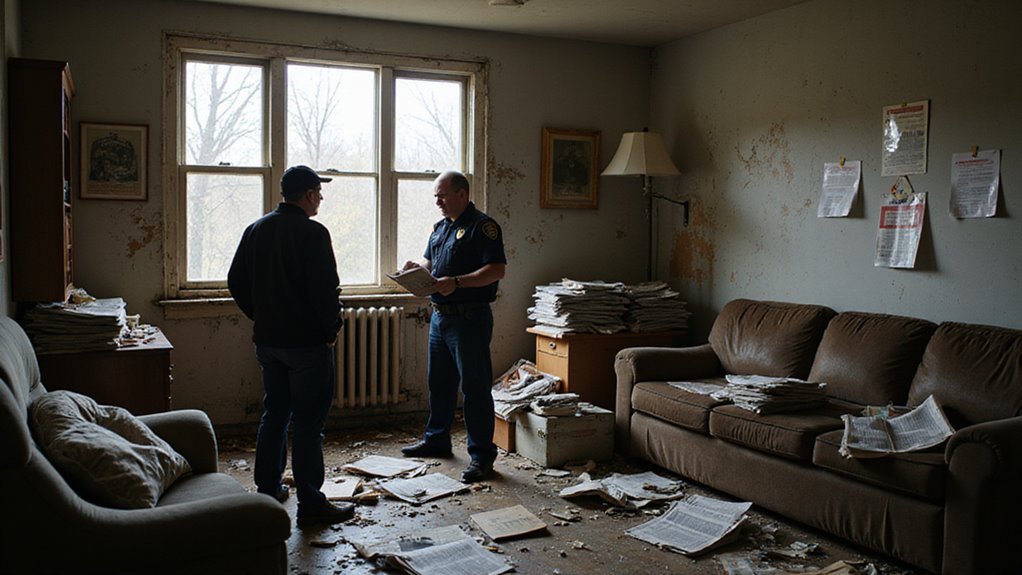
Dealing with code violations and fines is necessary when selling a hoarder home. Unresolved violations can lead to fines or liens, making selling hard. Check for city or county code problems before listing your home.
Common issues include hazardous waste, blocked exits, or pest infestations. Unpaid fines may result in property liens. Structural damage from neglect can also cause code violations.
If you find any problems, contact local authorities for help. They can guide you in fixing the issues. Fixing hazards first keeps your home safe and protects your investment.
Take quick action if you want to avoid legal and financial trouble. Resolving violations also makes your home easier to sell. Your legal and financial security depend on proper compliance.
Protecting Yourself With Seller Disclosures
Seller disclosures help protect you when selling a hoarder home. You must tell buyers about all known problems with the property. If you hide issues, buyers may take legal action later.
Sellers should mention any code violations, mold, pests, or dangerous materials. Buyers have a right to know about health or safety risks. Proper disclosures can prevent arguments after the sale.
If hoarding has affected the property, you need to share this information. Honest disclosures help buyers understand what they are buying. These steps protect you from claims of misrepresentation.
Clear and complete disclosures offer legal protection. If you are unsure about what to reveal, ask a real estate professional. If in doubt, it is safer to disclose.
Considering As-Is Sale Options
Selling a hoarder home as-is means you do not need to make repairs or updates. Buyers take the property exactly as it stands. This option can make the selling process quicker and simpler for you. Selling a hoarder home as-is lets buyers take it just as it is, making your sale faster and less complicated.
If you choose this route, you may get lower offers. Most buyers expect to pay less when a home needs work. Your heirs might benefit from a faster and easier sale.
You should think about the home’s condition before deciding. Common issues include piles of items left behind or broken appliances. Damaged walls, stained carpets, and neglected yards are also common.
There could be hidden safety or structural problems too. If you want to sell as-is, make a list of these concerns. Careful planning can help you make the best choice.
Working With Real Estate Agents Experienced in Hoarder Homes
Working with real estate agents who have experience with hoarder homes is important. These agents understand the special challenges these sales involve. They know how to handle the process from start to finish.
An experienced agent can set a fair price for the home. They consider the house’s current condition and any needed repairs. If the agent has a good local network, they can find buyers quickly.
Agents with this background know how to market hoarder homes. They often attract investors or buyers who want to fix up the property. If you want to sell as-is, this approach saves time and effort.
A skilled agent also helps lower your legal risks during the sale. If you need a smooth, legal transaction, their expertise is valuable. They make the whole process easier and more successful.
Understanding Buyer Rights and Recourse
You need to understand that buyers have specific rights if you don’t fully disclose a hoarder home’s condition. Failure to meet your disclosure obligations can open the door to legal remedies such as contract termination or even lawsuits. Knowing these potential consequences helps you protect yourself and maintain a powerful transaction.
Disclosure Obligations for Sellers
Sellers must tell buyers about any problems they know about in a hoarder home. State law says you must share anything that could affect the home’s value or a buyer’s choice. Honest disclosure protects you from legal trouble and future arguments.
If you hide big issues, you could face legal action later. Buyers need to know about the home’s condition, including dangers or damage from clutter. You should write down and share all known problems.
Common issues in hoarder homes include mold hidden under piles, floors damaged by too much weight, and pests living in clutter. Electrical or plumbing systems might not work right because of blocked access or damage. Hazardous materials or waste could also remain in the home.
Legal Remedies for Buyers
Buyers have legal options if a seller hides major problems with a hoarder home. State laws often require sellers to tell buyers about known issues. If sellers fail to do so, buyers may be able to cancel the sale or ask for money back.
You should keep records and take photos of hidden problems like mold or pests. An attorney who knows real estate law can explain your rights. Courts could give you money to pay for repairs or for distress caused by the problems.
If you want to take legal action, you must act quickly. State rules set time limits for making claims. Knowing your rights helps you deal with hidden issues and protect your home purchase.
Consulting Legal Counsel for Complex Cases
Consulting a lawyer is important when selling a hoarder home with legal issues. Legal counsel is needed for disputes, code violations, or unclear titles. A lawyer can help you avoid serious problems during the sale.
Lawyers can solve estate planning issues or title problems. They can guide you if there are liens or if the property value is in question. If buyers claim misrepresentation, a lawyer can protect you.
Consider hiring a lawyer if you face heir disputes, valuation disagreements, or code violations. Unresolved liens or accusations of nondisclosure also require legal help. Early advice from a lawyer can keep your sale safe.
Conclusion
If you plan to sell a hoarder home, you should address legal requirements first. If you disclose hazards and make necessary repairs, you help prevent future issues. If you work with professionals, you can make the process easier and safer for everyone involved.
If you want to sell quickly, we buy houses for cash in any condition. If you choose this option, you can avoid lengthy repairs and legal complications. If you need a fast solution, selling for cash may be the best choice.
If you are ready to sell your hoarder home, contact us at Align Real Estate Solutions. If you reach out today, we can discuss your options and provide a fair cash offer. We are here to help you move forward with confidence.
Author
-

Zach Koops is co-founder and Real Estate Success Manager at Align Real Estate Solutions, serving homeowners across Virginia since 2024. With a passion for real estate and a heart for people, Zach has built his career around helping sellers navigate tough situations—foreclosure, inheritance, relocation, repair-overload—with clarity and compassion. He’s known for being straightforward, steady under pressure, and deeply invested in relationships. Outside of work, he spends his time as a husband and father, enjoys the outdoors in Shenandoah Valley, loves singing on stage, and constantly seeks growth through reading and new experiences.



